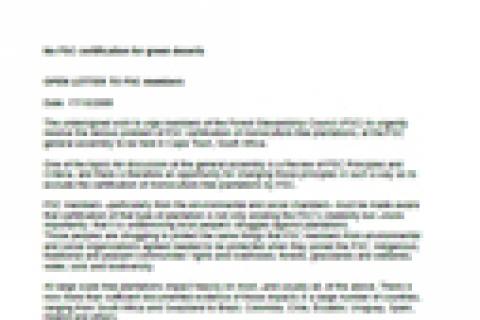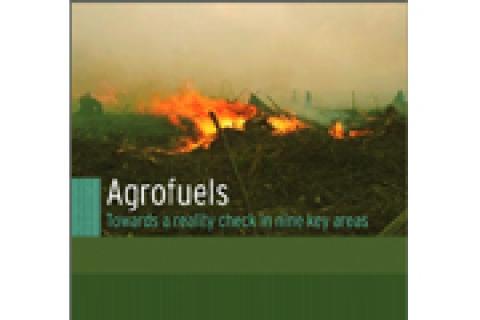Extensive areas of PNG’s tropical forests have been cleared to give way to export-oriented oil palm plantations, which have been established under the “Nucleus Estate Smallholder Scheme”. This means that a central company having its own plantation also contracts small farmers to supply it with oil palm fruit. The structure of the Nucleus Estate Smallholder Scheme and the nature of oil palm itself are raising serious concerns amongst civil society.
Other information
Only available in Spanish -
Señor Manuel Zelaya Rosales, Presidente de la República Señor Roberto Micheletti, Presidente del Congreso de la República Abogada Vilma Morales, Presidenta de la Corte Suprema de Justicia Diputadas y Diputados del Congreso Nacional Magistradas y Magistrados de la Corte Suprema de Justicia
By Various Organizations, June 2007
Foreword
This paper has been published on the occasion of the twelfth meeting of the Subsidiary Body on Scientific, Technical and Technological Advice (SBSTTA) of the Convention on Biological Diversity, Paris, 2-6 July 2007. This review of data and publications and policy analyses on many, often interconnected issues could only be achieved thanks to the contributions of many concerned citizens and experts from many countries.
The certifying firm SGS has launched a consultation process for the FSC certification of Veracel Celulose’s eucalyptus plantations. This company is owned by the Swedish-Finnish company Stora Enso and the Norwegian-Brazilian company Aracruz Celulose and its plantations are established on 78,000 hectares of land in the extreme south of the State of Bahia. The negative impacts of those plantations are resulting in considerable local resistance (see Bulletin No. 109). The main assessment will be made between 23 and 27 July 2007.
Through various programmes and state incentives, under the auspices of international cooperation agencies, monoculture tree plantations of fast growing species have been established in the three continental regions of Ecuador and are rapidly becoming widespread, generally destroying primary ecosystems.
Members of twenty-five Indonesian NGOs and community organisations met in Riau, Sumatra, on 13th January 2007, to give voice to their serious concerns about the impacts of the pulp and paper industry and its fastwood plantations on people and forests.
The web page http://www.southafrica.info, published for the International Marketing Council of South Africa, included in March an article which stated that “South Africa has identified the Eastern Cape and KwaZulu-Natal provinces as key for development in the forestry, wood and paper sector, with reforestation a vital part of the strategy”. For those who don’t know the forestry language, it is important to note that in South Africa the word “reforestation” really means planting vast monocultures of alien tree species on native grassland ecosystems.
Advance Agro is one of Thailand's largest pulp and paper companies, producing 427,000 tonnes of pulp and 470,000 tonnes of paper a year. The company markets its "Double A" brand of photocopy paper with a series of environmental claims. In May 2007, an Australian company called Access Economics added to these claims with a report titled "Environmental Benefits of Double A Paper".
The entrance to the bank has nothing to do with human scale. Built of steel and glass, the building towers over visitors like a spotlessly cleaned, giant machine. A machine for swallowing people and making money, perhaps.
Fiske Menuco (General Roca), (see footnote)*
The struggle between two agricultural projects has stepped up in Brazil. On the one hand, the agro-business project based on the concentration of vast stretches of land, on production for export, on large-scale production and on monoculture plantations, mainly of soybean, eucalyptus, and sugar cane.
At the end of April this year, the Brazilian Rural Landless Workers Movement (MST) was host at its Florestan Fernandes National School (Guararema, Sao Paulo) to almost 80 members of social movements and organizations from South America, Asia, Africa, and Europe attending the International Meeting on Monoculture Eucalyptus Plantations. The aim of this meeting was to define an agenda for joint action against the advance of monoculture tree plantations and pulp mills at global Southern level.



